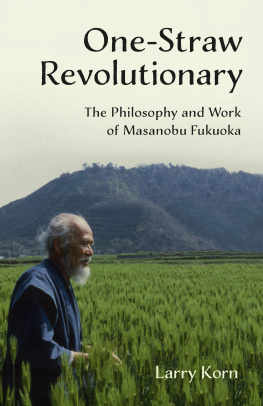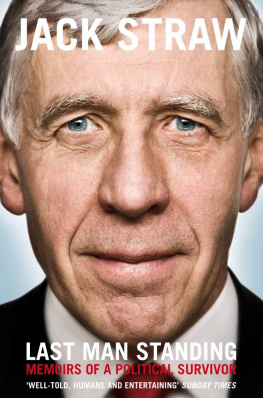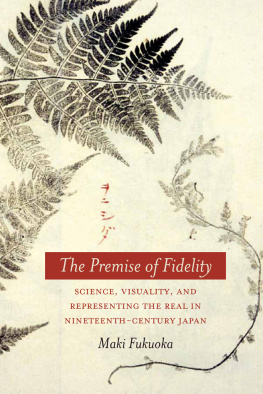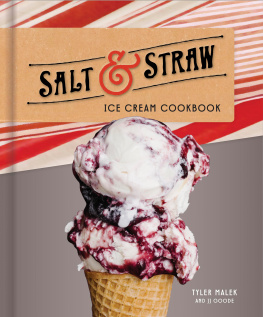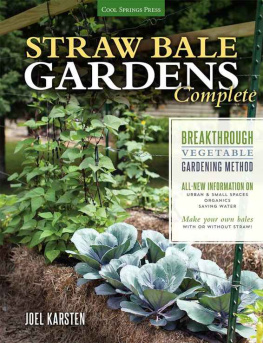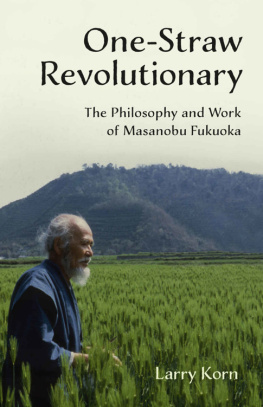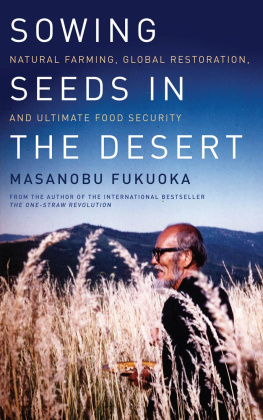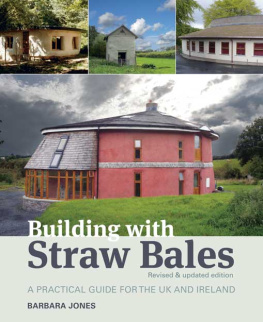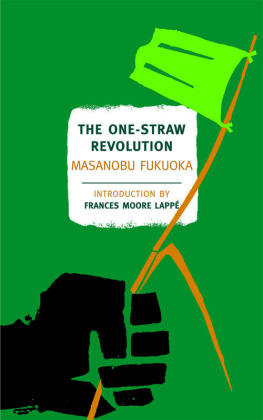Praise for One-Straw Revolutionary
Larry Korn virtually brings Masanobu Fukuoka back to life in One-Straw Revolution ary by highlighting his experience of more than thirty-five years of study with Mr. Fukuoka. Here we not only get a new look at Mr. Fukuokas natural farming but also his life in general. For those who have or have not read the insightful The One-Straw Re volution , I highly recommend this delightful book about one of the worlds great agricultural thinkers. JOHN P. REGANOLD , Regents Professor of Soil Science & Agroecology at Washington State University
In One-Straw R evolutionary , Larry Korn revisits his experiences with Masanobu Fukuoka, one of the most important thinkers in agricultural history. This book is a sort of sequel to Mr. Fukuokas The One -Straw Revolution , clarifying and amplifying that book and then going on to reveal Mr. Korns own intriguing contributions to the new social and agricultural order. GENE LOGSDON , author of Ge ne Everlasting and A San ctuary of Trees
One -Straw Revolutionary is a profound sharing of the essential philosophy of natural farming translated through the friendship between Larry Korn and Masanobu Fukuoka. Larrys engaging story offers wise insights into authentic practices that honor the community of all life. I deeply resonate with both the authors perspectives and Fukuokas clear understanding of a revolutionary pathway for creating abundance by honoring the natural patterns of our earth. KATRINA BLAIR , author of The Wild Wisdom of Weeds
I still think The One- Straw Revolution is the best book Rodale ever published, and we can thank Larry Korn for bringing it to us. Larrys deep insight into Fukuoka-sans Zen-like approach to farming threw a new light on the organic method of farming and gardening for me, as I was then an editor of Org anic Gardening magazine. Through Larry, I was able to see that the question is not, What can I do next? but rather, What can I stop doing without diminishing the results? This impulse toward simplicity is the masters great gift to the world, carried forth into the world by Larry Korn. JEFF COX , author of twenty books, including the best-selling From Vines to Wines and the James Beard Foundation-nominated The O rganic Cooks Bible , and former managing editor of Organic Gardening magazine
Larry Korn shines a light on the path that Fukuoka discovered integrating indigenous agriculture with a deep reverence for the land and natural processes. Many revolutions of the sun later, it is clear that the continued illumination of this path is necessary to bring about a stewardship culture of soil, plant, animal, and human. We are fortunate to have a torch bearer in Korn who embodies the words of Taoist sage, Lao Tzu: What you do is what you are. DON TIPPING , founder of Seven Seeds Farm and Siskiyou Seeds
This mind-opening book will provide the proper contextual knowledge and understanding on how nature works for any practitioner involved in farming, ranching, ecosystem restoration, or natural-resource management. RAY ARCHULETA , conservation agronomist, Natural Resources Conservation Service
Copyright 2015 by Larry Korn.
All rights reserved.
No part of this book may be transmitted or reproduced in any form by any means without permission in writing from the publisher.
Project Manager: Bill Bokermann
Project Editor: Brianne Goodspeed
Developmental Editor: Makenna Goodman
Copy Editor: Laura Jorstad
Proofreader: Helen Walden
Indexer: Peggy Holloway
Designer: Melissa Jacobson
Printed in the United States of America.
First printing August, 2015.
10 9 8 7 6 5 4 3 2 1 15 16 17 18 19
Our Commitment to Green Publishing
Chelsea Green sees publishing as a tool for cultural change and ecological stewardship. We strive to align our book manufacturing practices with our editorial mission and to reduce the impact of our business enterprise in the environment. We print our books and catalogs on chlorine-free recycled paper, using vegetable-based inks whenever possible. This book may cost slightly more because it was printed on paper that contains recycled fiber, and we hope youll agree that its worth it. Chelsea Green is a member of the Green Press Initiative ( www.greenpressinitiative.org ), a nonprofit coalition of publishers, manufacturers, and authors working to protect the worlds endangered forests and conserve natural resources. One-Straw Revolutionary was printed on paper supplied by McNaughton & Gunn that contains 100% postconsumer recycled fiber.
Library of Congress Cataloging-in-Publication Data
Korn, Larry, author.
One-straw revolutionary : the philosophy and work of Masanobu Fukuoka
/ Larry Korn.
pages cm
Other title: Philosophy and work of Masanobu Fukuoka
Includes bibliographical references.
ISBN 978-1-60358-530-9 (pbk.) ISBN 978-1-60358-531-6 (ebook)
1. Fukuoka, Masanobu. 2. No-tillage. 3. Organic farming. 4. No-tillageJapan. 5. Organic farmingJapan. I. Title. II. Title: Philosophy and work of Masanobu Fukuoka.
S604.K67 2015
631.5'814dc23
2015016871
Chelsea Green Publishing
85 North Main Street, Suite 120
White River Junction, VT 05001
(802) 295-6300
www.chelseagreen.com
There is no big or small on the earth, no fast or slow in the blue sky.
MASANOBU FUKUOKA
CONTENTS
Authors Notes
Through most of the text I have referred to Masanobu Fukuoka as Mr. Fukuoka. This English honorific is equivalent to the Japanese -san , a term of respect used for both women and men. Mr. Fukuokas formal title was Fukuoka-sensei. While the word sensei , or teacher, can refer to any teacher, when it is used for teachers possessing superior spiritual understanding the meaning is closer to sage. Most people addressed him simply as Sensei, which is the way I refer to him in the first-person narrative chapters of this book. When used alone the term reflects both familiarity and respect.
Additional photos of Mr. Fukuoka, his farm, and his travels can be found at www.onestrawrevolution.net .
Introduction
Masanobu Fukuoka (19132008) was a Japanese farmer and philosopher from the island of Shikoku. For more than sixty-five years Mr. Fukuoka developed a unique method of farming that has the potential to reverse the degenerative momentum of modern agriculture. Natural farming requires no machinery, no chemicals, no prepared compost, and very little weeding or pruning. Mr. Fukuoka did not plow the soil or flood his rice fields as farmers have for centuries in Asia and around the world. His method requires less energy than any other, needs no fossil fuel, and creates no pollution, yet the fertility of the soil increases with each passing season. Despite this unconventional approach, Mr. Fukuokas yields were comparable to, or greater than, those of the most productive farms in Japan.
This technique is a demonstration of Mr. Fukuokas back-to-nature philosophy. It proceeds from the conviction that if the individual temporarily abandons human will and so allows himself to be guided by nature, nature responds by providing everything. His message shows the way to a brighter future for humanity, a future in which people return to their appropriate place in the world and in so doing find peace within themselves. He considered healing the land and the purification of the human spirit to be one process, and demonstrated a way of life and a way of farming in which that process can take place.

